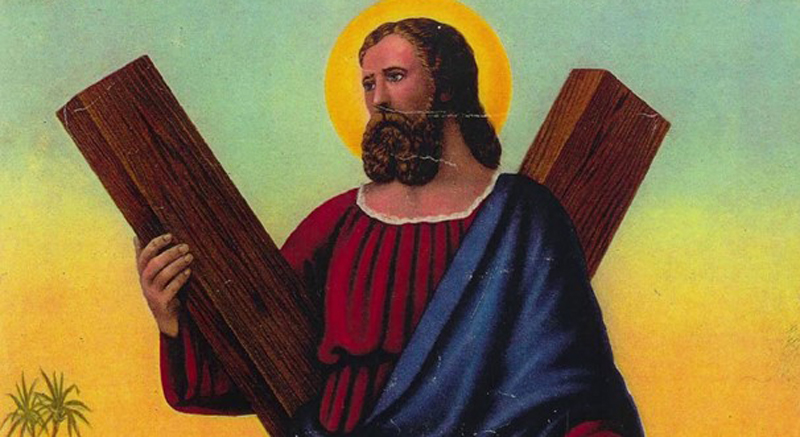(1st century)
Andrew, an early follower of St. John the Baptist, knew Jesus even before that famous day when Jesus, walking along the shores of the Sea of Galilee, told him, his brother Peter and the brothers James and John, to drop their nets and follow him.
Because Andrew discovered Jesus before his brother, who would become the father of the church, he is known as the “Protoklete” or “First Called” apostle. That makes Andrew significant in multiple ways, right from the beginning.
Peter was known as Simon bar-Jonah before receiving his Christian name “Simon,” being a name rich in the Jewish tradition and “bar-Jonah” meaning son of Jonah. When Jonah named his second son, he chose a name of Greek origin, “Andrew,” which roughly translated means “manly.” The significance this name holds for us is that Andrew is “just a man,” one of us.
Furthermore, given a Gentile, rather than Jewish name, Andrew shows us the influence of Greek culture in the Holy Land. The name is prophetic in that the message of Christ would grow beyond the boundaries of the Jewish culture, thus opening the door to salvation for all.
Andrew became one of Jesus’s closest confidence among the apostles. Together with his brother and the sons of Zebedee, James and John, he was witness to much of Christ’s important work. It was Andrew who informed Jesus about a young boy who had with him five barley loaves and two fish: not much, he remarked, for the multitudes who had gathered for his sermon to the multitudes. Andrew, like us, is a realist in this instance. What good would that little food be for so many? The situation offers a contrast between what is humanly, as opposed to divinely possible.
It was through the use of Andrew as his translator that Jesus spoke to the Greeks present for the Passover feast just before the Passion. Through Andrew he said, “The hour has come for the Son of Man to be glorified. I solemnly assure you, unless a grain of wheat falls to the earth and dies, it remains just a grain of wheat; but if it dies, it produces much fruit” (12: 23-24).
In this way, Jesus explains that I (like the grain that dies) must die so that you may spring forth in a new Christian life. Again, Andrew functions as a conduit of Christianity to the Gentile world.
After Jesus left the mortal world, Andrew became the apostle to the Greek world. Tradition says that Andrew was martyred on Greek soil. Sentenced to crucifixion, he asked to be nailed to a different cross from that of Jesus, feeling unworthy to die in like fashion. An “X”-shaped cross was used and is his symbol.
As patron of Scotland, the figure of his cross, stylistically appears on that land’s flag. Andrew is also patron of: Barbados, Georgia, Ukraine, Russia, Greece, Cyprus, Romania, Patras, Burgundy, San Andrés (Tenerife), Diocese of Parañaque, Candaba, Pampanga, Telhado, Sarzana, Pienza, Amalfi, Luqa (Malta) and Prussia, as well as the Diocese of Victoria.
While Peter became the first pope in Rome, Andrew held a special place in the See of Constantinople. In 1964, Pope Paul VI returned the head of St. Andrew which had been housed in the Vatican to Pátrai, the traditional city of Andrew’s martyrdom, as a gesture of good will toward the Christians of Greece.
The rapprochement of the two Christian churches took another step when the ecumenical patriarch of Constantinople, Bartholomew I, visited Pope Francis on the occasion of his election to the pontificate. As the successor of St. Peter, Francis noted the role of Patriarch Bartholomew as the successor of St. Andrew and referred to him as “my brother, Andrew,” casting the two of them in the roles of the original brother apostles.
Adapted by A.J. Valentini from: Akin, J. (2020, August 28). St. Andrew the Apostle: 11 things to know and share. NCR. https://www.ncregister.com/blog/st-andrew-the-apostle-11-things-to-know-and-share
